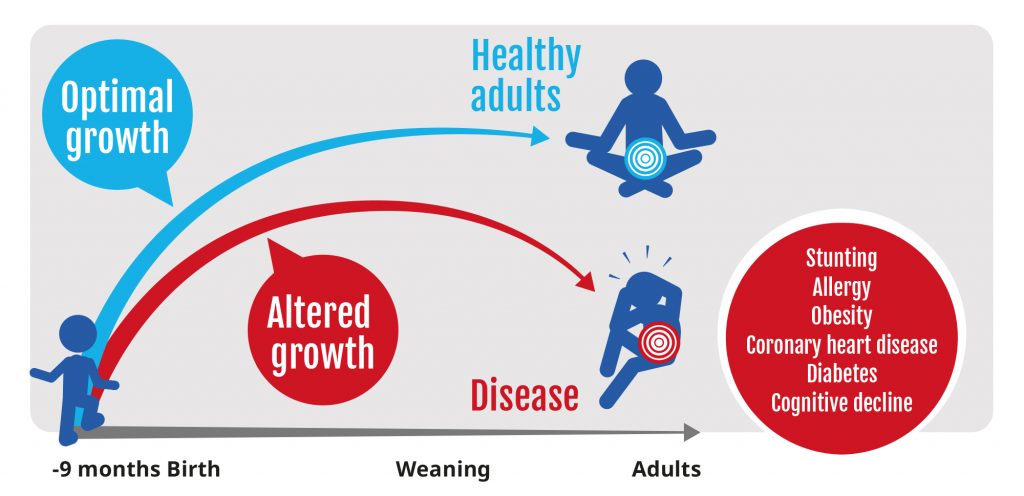The nutrients a baby consumes in the first 1,000 days have a lasting effect on future health and development. As tissues and organs are still forming, it’s vital to establish good nutritional programming and healthy eating habits in the early days.
The early period of a baby’s life – from conception to the age of two – is also known as the first 1,000 days and is a period of tremendous growth and development1. During this critical period of growth, a child’s organs and tissues are being formed and educated, setting the foundation for lifelong health.

Adequate nutrition during the first 1,000 days – that includes the mother’s nutritional status during pregnancy and optimal infant nutrition post-birth – is one of the fundamental prerequisites for survival, growth, development and lifelong good health2,3. It is vital to establish good nutritional programming and healthy eating habits in a child’s first 1,000 days, as this affects adult health later on in life, including the risk of developing a non-communicable disease (NCD)2.
BREASTFEEDING FOR A HEALTHY START IN LIFE
Meeting specific nutritional needs is particularly important for infants with sub-optimal fetal growth and development who may have a higher need for additional nutritional support compared with healthy full-term born babies4.
Breastfeeding a baby exclusively in the early days means infants will have the best start in life as breast milk contains a wide range of nutrients – seizing this window of opportunity in the first year will help aid metabolic development, good health and means infants will receive all the nutrients they need from their mother5.
Breastfeeding also promotes an optimal balance between energy use and energy storage, which helps protect against obesity and NCDs in later life5-7. The beneficial effects of breast milk are due to many bioactive compounds, for example oligosaccharides, and a low level of bacteria (e.g. Streptococci, Lactobacilli and Bifidobacteria). Naturally occurring metabolites also mean breastfeeding is better for a baby’s health8. A child’s first 1,000 days will help shape future eating habits, nutritional programming and the wellbeing of the mother and baby. With the right nutrients, health and feeding routines, the baby will thrive.
References
- 1,000 Days. Why 1,000 days? [online]. Available at: www.thousanddays.org doi:10.1016/S0140-6736(13)60355-4 [Accessed Nov 2019]
- Hanley, Bryan, et al. “Metabolic imprinting, programming and epigenetics–a review of present priorities and future opportunities.” British journal of nutrition 104.S1 (2010): S1-S25.
- Wrottesley, S. V., C. Lamper, and P. T. Pisa. “Review of the importance of nutrition during the first 1000 days: maternal nutritional status and its associations with fetal growth and birth, neonatal and infant outcomes among African women.” Journal of developmental origins of health and disease 7.2 (2016): 144-162.
- Wrottesley, S. V., C. Lamper, and P. T. Pisa. “Review of the importance of nutrition during the first 1000 days: maternal nutritional status and its associations with fetal growth and birth, neonatal and infant outcomes among African women.” Journal of developmental origins of health and disease 7.2 (2016): 144-162..
- Mandel, Dror, et al. “Fat and energy contents of expressed human breast milk in prolonged lactation.” Pediatrics 116.3 (2005): e432-e435.
- Singhal, Atul. “The role of infant nutrition in the global epidemic of non-communicable disease.” Proceedings of the Nutrition Society 75.2 (2016): 162-168.
- Armstrong, Julie, and John J. Reilly. “Breastfeeding and lowering the risk of childhood obesity.” The Lancet 359.9322 (2002): 2003-2004.
- Scholtens, Petra AMJ, et al. “The early settlers: intestinal microbiology in early life.” Annual review of food science and technology 3 (2012): 425-447.
BA19-485
